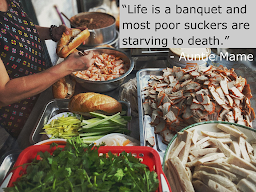One night in the East Village for dinner I ate at the Lan Café with some friends.
The sanguine salute Sham gives is accompanied tonight with a warm cup of tea and a smile. To fancy a cup of tea is a prelude to friendship. An exchange executed with grace and humble style; cooped together in his tiny East Village apartment, Steve and I, along with Srngara, his wife, and Nitai, their son, quibble about theater, Krishna, and whether the Lan Café is the best vegetarian restaurant in Manhattan. Or anywhere. Steve says drinking their freshly squeezed carrot juice is like drinking a garden.
Stones of Erasmus does not purport to be a food column. So I do not claim an argument for culinary taste on these pages. But I feel compelled to write about the Lan Café.
The waiter greeted us with pleasant monosyllables. "Good," "Everything," "Yes?" "No." Then a few choice two worders. "Of course," "You like?" "Heh heh."
The "heh heh" was for Steve who said the food tasted like kissing Woodrow Wilson's wet lips. That was meant as a compliment.
Vegetarian Dishes are Palatable (Yum-Yum)
I should say, along the lines of a food critic, the Vegetarian Shrimp Papaya Salad is doubly sweet and spicy without a hint of overindulgence. It's made from pieces of vegetarian shrimp with a healthy dose of bean sprouts. The sauce makes the dish.
The kitchen staff prays a mantra over every cooked meal.
The dining room is intimate which encourages conversation with other guests. Two couples dined next to our boisterous table. Across from us a group of New York intelligentsia dined while chugging Brooklyn Lager.
When people popped in to check the place out, Steve would opine, "Come in. This place is the best restaurant in Manhattan." The lady next to me wondered if Steve was being paid for every promotional sentence he uttered.
And for Dessert? Something Carrot-y.
When Nitai tasted my carrot juice (like drinking a whole ripe carrot) his eyes widened and he danced a jig. A kid dancing a jig is enough for everyone in the place to stop what they're doing and stare. He told the captive audience (the other restaurant-goers) that the carrot juice was "soooooooo goooooood" but, he said, "it just needs some chocolate on top." I told him chocolate would spoil it. Nitai didn't seem to agree.
Who can argue with a six-year-old? A woman crooned, "Oh, he's so cute." I waited for her to say, "Can I take him home with me?" People do not talk like that.
We walked home with freshness in our bellies and guava candy in our mouths.
Location: East Village, New York City








